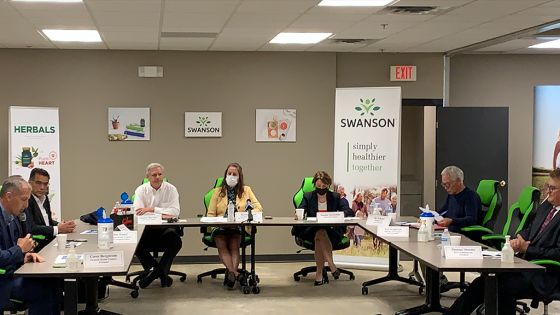What the DEC is the District Export Council?
Ocean Shipping Issues with Senator John Hoeven (R-ND) and
Senator Amy Klobuchar (D-MN). Date: Sept. 1, 2021
Closely affiliated with the U.S. Department of Commerce’s U.S. Commercial Service, District Export Councils (DEC) serve as the “Voice of the Exporter” in their localities around the United States. Approximately 1,500 DEC members, from both rural and urban areas, volunteer their time in 61 DECs around the country. The pillars of all District Export Councils are to inform, educate, advocate, and assist local members and companies in becoming successful exporters. The DECs are unique in that they work directly at the local level with businesses assisting them with exports. This can include, but is not limited to, education, advocacy, networking, and mentoring.
Education and Accommodating Rural Audiences with Virtual Access
DECs are in a unique position to provide real-life experience and examples of the exporting process, whether for children in schools, new exporters, or other experienced exporters.
Many local DECs cover vast territory and have to accommodate very long travel distances for their members. For example, Idaho covers 83,000 square miles with hundreds of rural exporters across the large state. Local DECs, like the Idaho DEC, provide ongoing educational opportunities for new and existing exporters via in-person and virtual webinars by sharing expert export advice from IDEC members as well as government entities like EXIM, US Commerce, Idaho State Government, and others.
The Arkansas District Export Council (ARDEC) has also traditionally provided a basic course for potential exporters, called “Grow Your Exports.” Before the pandemic, this course was in-person in various venues around the state. However, during the pandemic, it moved to an online format. The participants also had the opportunity to meet with a DEC Member located in their area, just to chat over coffee and talk exports, to find out if the DEC can help them in any way. At least two of the attendees have taken up this offer and mentoring relationships have started to blossom. The Arkansas District Export Council’s 6-session “Grow Your Exports” series is available on its YouTube Channel.
The Arkansas DEC also provides other channels for rural exporters to learn about exporting. The DEC refers companies to an online export training website (Export-U.com, hosted and maintained by the Georgia DEC and the U.S. Commercial Service in Georgia), which has 20 webinars on practical topics related to exporting. The website also offers the Exporter’s Resource Database, which has over 200 trade-related publications.
The Wisconsin District Council supports businesses through ExporTech, which offers 24 hours of customized, action-oriented export expansion strategy development. In partnership with the Wisconsin Economic Development Corporation, the U.S. Commercial Service Wisconsin, and NIST Manufacturing Extension Partnership, Wisconsin’s ExporTech participants averaged $1 million in new revenue business results in year one.
Advocacy
The North Dakota DEC was concerned about a lack of export resources for rural exporters. The support of the North Dakota DEC was instrumental in the creation and funding for the Rural Export Center, a market research center created in May 2020, and based in Fargo, ND. Some DECs invite Congressional staff to join their meetings as an opportunity to hear the issues multiple exporters are facing in their backyard. The Idaho DEC has a regular cadence of congressional outreach, including Idaho Exporter round table trade discussions with Idaho elected officials and their staff.
Lockheed Martin in Camden, Arkansas in July 2022.
Networking
Another area DECs exercise export leadership in their communities is by hosting regular networking events to connect service providers, institutions, and exporters and share export success stories and opportunities. The Arkansas District Export Council (ARDEC) has always supported rural exporters and agricultural exporters in particular. Since 2010, ARDEC has hosted the Governor’s Award for Excellence in Global Trade, usually including at least one agricultural exporter as a winner. In 2022, the ARDEC awarded the Governor’s Award trophies to both Riceland Foods, a major producer of milled rice, and to Smart Repro, owned by Brittany Scott, which produces male goat and sheep gametes for export to developing countries. Shortly after winning the Woman-Owned Exporter Award, Smart Repro received multiple international queries from new clients in novel markets due to the press resulting from the award. ARDEC members have utilized the Rural Export Center’s REC Research and the Website Globalization Review service.
Mentoring
Local DEC members share their personal experiences with businesses new to exporting through mentoring. The Idaho DEC has a client coaching program where it has teamed with the U.S. Commercial Service to identify twelve Idaho businesses that connect with an experienced international business executive who works with them. More than half of these companies are rural exporters. The Idaho DEC members are helping these companies with issues such as improving their international finance and logistics capabilities and terms as well as working with sales executives to help them increase their international sales and build a sales plan for their products and key markets. It’s an exciting pilot program that they are looking to scale in the future. The North Dakota DEC has recently initiated a “DEC Check” program, where an exporter presents their exporting challenges to the DEC members during a meeting and receives suggestions, brainstorming, feedback, tips, and best practices from the experienced DEC members in attendance.
DECs are excited to promote U.S. export promotion efforts and help companies succeed in international markets. To find your local DEC, please visit the District Export Council website.

